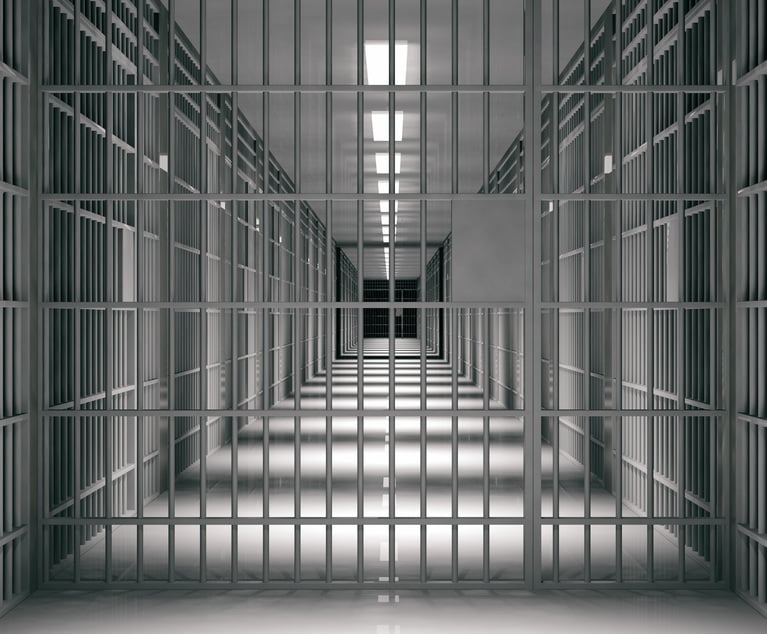BAR REPORT - Capitol Report
Governor signs remote notary legislation NJSBA helped shape
April 20, 2020 at 08:00 AM
5 minute read
Governor signs remote notary legislation NJSBA helped shape
The much-anticipated remote notary bill was signed into law by Governor Phil Murphy last week, opening up the ability to notarize documents using communication technology that would permit individuals to communicate simultaneously using sight and sound, a win for the state's legal community.
The New Jersey State Bar Association (NJSBA) had been urging legislators to allow remote notary acknowledgements since the beginning of the COVID-19 crisis. A previous version of the bill was limited to only notaries public, and would not have been effective for 90 days.
After hearing of heroic efforts made by members to obtain valid notary acknowledgements in parking lots, on front porches and across backyards, where safe social distancing measures could be employed, the NJSBA successfully urged that a new bill be introduced that would take effect immediately. When first drafted, however, A-3903 (Downey)/S-2336 (Greenstein), was limited in its application. The NJSBA successfully urged amendments to expand the ability to notarize to all individuals able to administer oaths and authorizations statutorily—specifically attorneys—and to remove the prohibition against remotely notarizing wills and codicils. The bill took effect last week, and lasts only for the duration of the public health emergency and state of emergency declared by the governor in Executive Order 103 of 2020.
Governor enacts COVID-19 response laws following remote voting session
In a remote voting session—the first for the Senate and the second for the Assembly—the Legislature sent a group of bills to the governor addressing the budget, an extension of filing deadlines for tax filings and payments, immunity for healthcare professionals and facilities, and benefits and Medicaid coverage.
COVID-19 Fiscal Mitigation Act
The deadlines for filing gross income tax returns or making payments has been extended to July 15, 2020. The governor signed A-3918 (Pintor Marin)/S-2338 (Sarlo), which also clarifies the timeframes for filing returns and the imposition of penalties or interest, and extends the statute of limitations to assess taxes by 90 days following the conclusion of the state of emergency. The bill also modifies the duration of the state's fiscal year 2020 to conclude on Sept. 30, 2020, and sets the new fiscal year as beginning Oct. 1, 2020, requiring additional spending authorizations to be made through the enactment of general law that amends or provides for a supplemental appropriation to that annual appropriations act. The bill further clarifies that it does not modify municipalities that adopt the state's fiscal year and does not prevent municipalities from converting to a calendar fiscal year.
Healthcare immunity bill protects healthcare professionals and facilities
Healthcare professionals and healthcare facilities and systems will receive immunity from civil and criminal liability for certain malpractice claims alleging injury or death incurred during the public health emergency and state of emergency declared under Executive Order 103. Amended on the floor during the vote, the Legislature approved a preamble explicitly stating the legislative intent of the bill "because of the lack of committee hearings." The bill strives to remove impediments to providing medical treatment in COVID-19-related emergencies, and grants "all medical personnel supporting the COVID-19 response" immunity. The statement makes clear that it is not the intent of the Legislature to "grant immunity to medical services, treatment and procedures that are unrelated to the COVID-19 emergency." Despite this amendment, the bill drew concerns from legislators regarding the impact on communities of color, which are believed to be susceptible to comorbidities that would lead to being given less priority for respirator treatment in favor of individuals without such comorbidities. The bill is retroactive to March 9.
Relaxation of mass layoff severance requirements
Notification regarding mass layoffs was relaxed to exclude layoffs necessary because of "a fire, flood, natural disaster, natural emergency, act of war, civil disorder or industrial sabotage, decertification from participation in the Medicare and Medicaid programs." A-3983 (Quijano)/S-2353 (Cryan) is effective retroactive to March 9, and provides protections for employers from the required notifications during the current public health emergency and state of emergency. In addition to relaxing the notification requirements, it also changes the severance requirements for employers in the case of mass layoffs, or termination or transfer of operations. The bill makes the change to the definition of mass layoff retroactive to March 9 and amends the effective date of the NJ WARN Act regarding severance requirements for employers to the 90th day following the termination of Executive Order 103.
This is a status report provided by the New Jersey State Bar Association on recently passed and pending legislation, regulations, gubernatorial nominations and/or appointments of interest to lawyers, as well as the involvement of the NJSBA as amicus in appellate court matters. To learn more, visit njsba.com.
This content has been archived. It is available through our partners, LexisNexis® and Bloomberg Law.
To view this content, please continue to their sites.
Not a Lexis Subscriber?
Subscribe Now
Not a Bloomberg Law Subscriber?
Subscribe Now
NOT FOR REPRINT
© 2025 ALM Global, LLC, All Rights Reserved. Request academic re-use from www.copyright.com. All other uses, submit a request to [email protected]. For more information visit Asset & Logo Licensing.
You Might Like
View All
In 2-1 Ruling, Court Clears Way for Decade-Old Wrongful Imprisonment Suit
5 minute read

So Who Won? Congestion Pricing Ruling Leaves Both Sides Claiming Victory, Attorneys Seeking Clarification
4 minute readTrending Stories
- 1'It's Not Going to Be Pretty': PayPal, Capital One Face Novel Class Actions Over 'Poaching' Commissions Owed Influencers
- 211th Circuit Rejects Trump's Emergency Request as DOJ Prepares to Release Special Counsel's Final Report
- 3Supreme Court Takes Up Challenge to ACA Task Force
- 4'Tragedy of Unspeakable Proportions:' Could Edison, DWP, Face Lawsuits Over LA Wildfires?
- 5Meta Pulls Plug on DEI Programs
Who Got The Work
Michael G. Bongiorno, Andrew Scott Dulberg and Elizabeth E. Driscoll from Wilmer Cutler Pickering Hale and Dorr have stepped in to represent Symbotic Inc., an A.I.-enabled technology platform that focuses on increasing supply chain efficiency, and other defendants in a pending shareholder derivative lawsuit. The case, filed Oct. 2 in Massachusetts District Court by the Brown Law Firm on behalf of Stephen Austen, accuses certain officers and directors of misleading investors in regard to Symbotic's potential for margin growth by failing to disclose that the company was not equipped to timely deploy its systems or manage expenses through project delays. The case, assigned to U.S. District Judge Nathaniel M. Gorton, is 1:24-cv-12522, Austen v. Cohen et al.
Who Got The Work
Edmund Polubinski and Marie Killmond of Davis Polk & Wardwell have entered appearances for data platform software development company MongoDB and other defendants in a pending shareholder derivative lawsuit. The action, filed Oct. 7 in New York Southern District Court by the Brown Law Firm, accuses the company's directors and/or officers of falsely expressing confidence in the company’s restructuring of its sales incentive plan and downplaying the severity of decreases in its upfront commitments. The case is 1:24-cv-07594, Roy v. Ittycheria et al.
Who Got The Work
Amy O. Bruchs and Kurt F. Ellison of Michael Best & Friedrich have entered appearances for Epic Systems Corp. in a pending employment discrimination lawsuit. The suit was filed Sept. 7 in Wisconsin Western District Court by Levine Eisberner LLC and Siri & Glimstad on behalf of a project manager who claims that he was wrongfully terminated after applying for a religious exemption to the defendant's COVID-19 vaccine mandate. The case, assigned to U.S. Magistrate Judge Anita Marie Boor, is 3:24-cv-00630, Secker, Nathan v. Epic Systems Corporation.
Who Got The Work
David X. Sullivan, Thomas J. Finn and Gregory A. Hall from McCarter & English have entered appearances for Sunrun Installation Services in a pending civil rights lawsuit. The complaint was filed Sept. 4 in Connecticut District Court by attorney Robert M. Berke on behalf of former employee George Edward Steins, who was arrested and charged with employing an unregistered home improvement salesperson. The complaint alleges that had Sunrun informed the Connecticut Department of Consumer Protection that the plaintiff's employment had ended in 2017 and that he no longer held Sunrun's home improvement contractor license, he would not have been hit with charges, which were dismissed in May 2024. The case, assigned to U.S. District Judge Jeffrey A. Meyer, is 3:24-cv-01423, Steins v. Sunrun, Inc. et al.
Who Got The Work
Greenberg Traurig shareholder Joshua L. Raskin has entered an appearance for boohoo.com UK Ltd. in a pending patent infringement lawsuit. The suit, filed Sept. 3 in Texas Eastern District Court by Rozier Hardt McDonough on behalf of Alto Dynamics, asserts five patents related to an online shopping platform. The case, assigned to U.S. District Judge Rodney Gilstrap, is 2:24-cv-00719, Alto Dynamics, LLC v. boohoo.com UK Limited.
Featured Firms
Law Offices of Gary Martin Hays & Associates, P.C.
(470) 294-1674
Law Offices of Mark E. Salomone
(857) 444-6468
Smith & Hassler
(713) 739-1250







